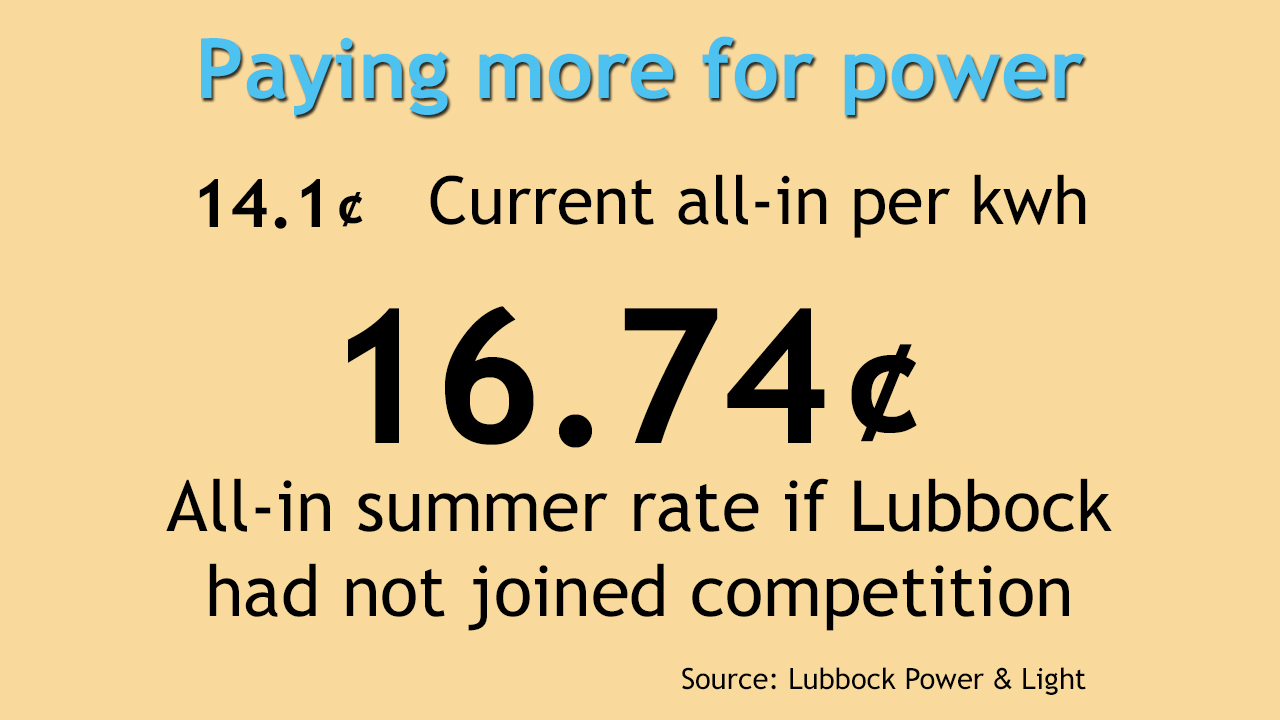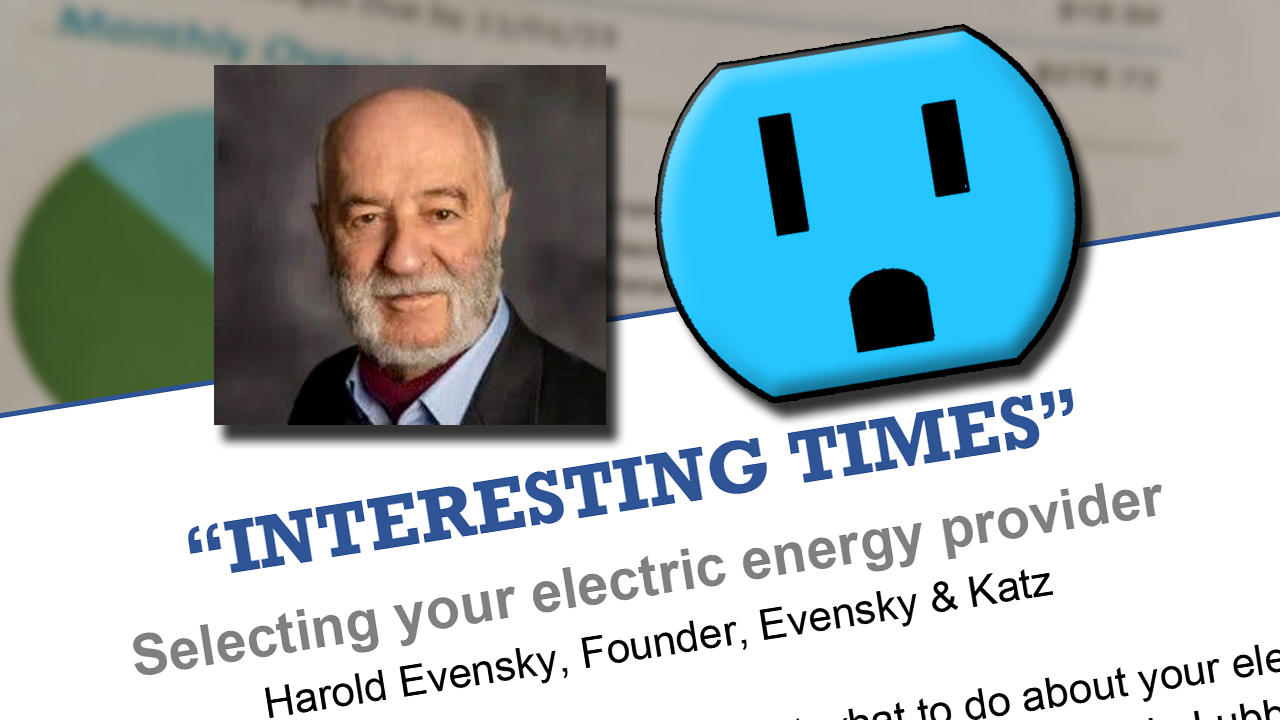The deadline is approaching for Lubbock Power & Light customers to choose an electric provider. But as of Friday, 75 percent haven’t done it.
Missing the Feb. 15 deadline sends you to a default provider – TXU, Octopus or Reliant Energy.
“I didn’t want to be just assigned a provider,” said Harold Evensky, a retired Texas Tech professor of personal finance.
“Probably like most of the citizens in the community, when this came up and I started looking into it, all I could do was scratch my head,” Evensky said.
If you dig hard enough and remove all the filters on powertochoose.org, you can find 66 plans for Lubbock.
“I found the whole thing fairly confusing,” said the professor who spent his whole career helping people make clear decisions about managing their money.
So, “Harold’s how-to on power companies” was born. Technically, it’s called “Interesting Times: Selecting your electric energy provider.”
Evensky found the provider that fits his needs and here’s his step-by-step advice to making your choice.
Introducing Evensky
Evensky is one of the founders of Evensky & Katz/Foldes Wealth Management which has offices in Miami, Seattle and Lubbock. He retired as a professor in 2018 according to the Texas Tech website.
He credits his wife, Deena B. Katz, for making personal finance at Texas Tech as both one of the first and preeminent programs in the country.
“But yes, we were both extremely involved,” he said of Tech.
He’s also a book author and an internationally recognized conference speaker.
“The job of the planner is to help people enjoy their lives,” Evensky told LubbockLights.com. “We’re not trying to beat the system. Philosophically, we don’t think that’s possible anyway.”
The how-to guide made its way to Lubbock clients of Evensky’s company. It also went to members of his wife’s church and members of his temple.
“The more people I get it out to that they find it useful, the happier I am,” he said.
Ongoing Coverage: The Big Switch
First – narrow it down
“I’m biased,” Evensky said. And that bias is toward being secure and comfortable. Price is not the most important consideration.
Evensky went to powertochoose.org and put in his zip code. But the list was “kind of mind boggling.”
“My recommendation is that you start off by narrowing it down by the company quality rating,” Evensky said. “I simply set the screen up for five stars.”
“I ended up with about five choices,” he said.
LubbockLights.com followed his first step and found five companies offering 14 different plans.
“The other thing I looked at was the Better Business Bureau rating,” Evensky said. “I’m not looking for surprises, and I’m not looking to save an extra $10 or $20 a month.”
“It’s a pig in a poke,” he said of the cheaper companies. That’s his way of saying be careful.
How much power
You can make a choice without knowing your monthly bill, but there are price differences in some plans based on 500, 1,000 or 2,000 kilowatt hours per month.
Your monthly bill has a 12-month history so it’s easy to find.
Evensky suggests using 2,000 as the underlying assumption. Check if a plan has a minimum usage requirement.

Next step – lock it in
Evensky highly recommends a fixed-rate plan. That’s the same advice Matt Rose, public affairs and government relations manager for city’s electric utility, gave.
“I’m going to try to find something that’s truly a fixed rate – as flat as it can possibly be,” Rose said during a community meeting in December.
Short term plans have the same problem as variable rates, Evensky said.
“If you take the longer plan, you know what you have locked in,” he said. “But it’s not that expensive to change down the road if rates should drop dramatically.”
There is an early cancelation fee with many companies. The highest we found in our own search was $300.
Getting a three-month plan means renewing in the summer when rates are notoriously higher.
“I’d say somewhere between the 24 and 36 months would be my general recommendation,” Evensky said.
Other costs
Some companies have a monthly base charge regardless of how much power you use. Your new bill will include an energy rate, transmission fee, a customer fee (meter charge) and taxes.
If your contract expires, you might pay more on a month-to-month basis. Evensky recommends getting a new contract to replace the one that expires.
Special offers
“Many providers have special offers,” his guide said. “For example, TXU offers half energy charges December through February and June through August but at an increased base rate.”
TXU calls this plan the “Season Pass.”
Companies advertise free nights and weekends, but the rates are higher at other times to make up for it, Rose said, adding, “Just know, nothing’s free. Don’t chase gimmicks.”
A special deal can work. Evensky chose such a plan. But he also did the math to make sure it works all year long – not just some of the time.
“Based on my past usage, if I picked that versus the fixed 12 months, which one is likely to be better?” he rhetorically asked.
If you mess up
Harold’s-how-to is a guide, but you still must make your own choice. After seeing the guide, if you have questions, you can email Evensky: [email protected].
“The good news is if you make a mistake or if you decide down the road that you probably don’t have the best alternative, the cost of making a switch is not particularly expensive,” Evensky said.
“So, it’s not like this is a horribly irrevocable decision,” he added.
Evensky asked us to not reveal the company and the plan he chose.
“I want people to make their own decisions.”
As for churches, non-profits and businesses, Evensky thinks the specific details for a commercial plan are different from residential, but it’s the same basic logic.
“It is confusing, but if you break it down, I felt reasonably comfortable in the process that I used,” he said.
Comment or share: on our Facebook page
Editorial note: After this article was published, Mr. Evensky informed us that his analysis of renewable energy changed as he learned new information. This article was updated.


 Facebook
Facebook